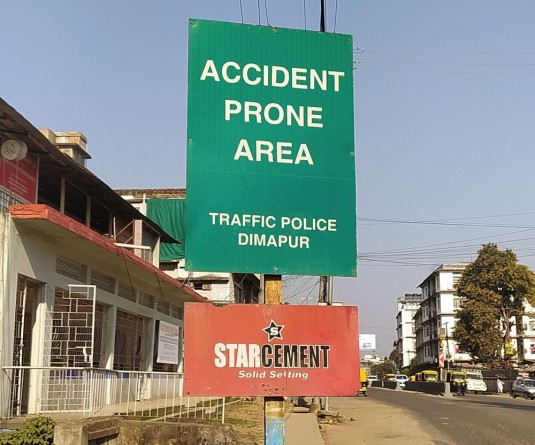
Atola Longkumer
The long awaited monsoon brings with it precious water making the green valleys and the hills verdant, but also pouring threatening wrecks, particularly in the northeast region of the country. This is what I experienced some weeks ago. I quite don’t know what it was: a dull spirit of adventure, necessity of shinrin-yoku (forest bathing), professional loyalty, call of home, or a noble cause, but I realised that I had picked the most ominous season to travel home; Nagaland being home. The rains have been torrential and threatening, discomfort and destruction ensured to the maximum.
The flight from Kolkota to Dimapur almost did not make it, the report of rains flooding the runway at Dimapur airport discouraged the scheduled flight to take off from Kolkota. Five hours late from the scheduled time, after fervent pleadings and prayers, the flight took off from Kolkota, literally, on a wing and a prayer, that the rain gods would not resume their dance before the flight landed in Dimapur. The particular airline deserves kudos for the professionalism and commitment to get the passengers to their destination. I dread to think of the possible scenarios if it was the other notorious one! Anyway, 14 hours since leaving for home, I was in home soil, pleased to reach halfway of the travel in one day’s time. Another day’s worth of uphill travel remaining before reaching the destination. The word ‘uphill’ here describes both the topography and the state of the travel.
As I sat at the Netaji Subash Chandra Bose International Airport, Kolkota, watching people, involuntary eavesdropping on conversations of strangers (why are the decibels always higher in our part of the world?), minutes turning to hours, anxious and irritated with the uncertainty of the scheduled flight and consequently the possible havoc to the travel itinerary, my thoughts went to memories of reading fascinating account of express train from Beijing to Lhasa as filed by Pallavi Aiyar in the national paper The Hindu almost a decade ago. The burden of being stranded halfway also took my wondering thoughts to another report of a swanky, clean and fast train between Beijing and Shanghai, reported by a journalist in the same national daily, who had travelled there, and was musing over his experience in comparison to the train he and his wife took upon return. The comparison is best in his own words, “[m]y wife and I travelled from Beijing to Shanghai by a high-speed train days after it was introduced two years ago. A week later, on our return journey from a holiday in the ‘Land of Dragons and Emperors,’ we took the Ernakulam-Coimbatore Inter-City Express. Both journeys were completed under five hours. The distance between Beijing and Shanghai is 1,318 km and between Ernakulam and Coimbatore: 178 km.” http://www.thehindu.com/opinion/open-page/Why-are-we-on-slow-track/article12377368.ece
Arriving in Dimapur and the ride from the airport into town was another sight and experience. The next day travel in the famous sumo that serves the citizens of Nagaland as the basic mode of connectivity between towns and villages was unbearably memorable. Beginning with the squalor and the stench of the sumo stand and the rocking ride up the mountain terrains on roads probably from the British days, was a journey that was disturbing to one’s moral compass and dislocating to the fragile bones. The muck and muddy dirt from the overflowing drainage made all the senses shrivel and the stench lingered on. The contrasting sight that cannot be missed were the dainty young people, dyed blond and brunette, attired rather unseasonal. Rubber boots would have been more weather friendly rather than delicate ballerinas and adidas sneakers. The point is not about rubber boots or gumboots, or willies as they are also called, derived from Wellingtons, it is rather the state of our home. The rain reveals the deepest nadir that we can take ourselves to. The conditions of the roads and the connectivity tell a thousand stories of neglect, corruption, ethical compass, mismanagement, indifference, powerlessness, resignation, and even religious hypocrisy. A disturbing thought was the realisation that the people seem to have accepted to live in such conditions of wretchedness. No questions asked, no actions initiated, no demands made, perhaps the burden of daily survival outweighs the right to quality of life.
My thoughts returned to the comparison made between China and India about speed of trains by the Indian journalists. Recalling these news reports and other recent developments of ASEAN economy just across the border in Myanmar ignite an ambiguous feeling – not exactly schadenfreude – because there is no misfortune of anyone for someone’s joy ; yet there might be reasons for hope in the fast growing and far reaching ASEAN economy. Complex as it is, globalization and easy movement of goods might still lead the way to the urgent need of supervised, accounted and visible developments the regions in the Northeast – such as Nagaland need.



